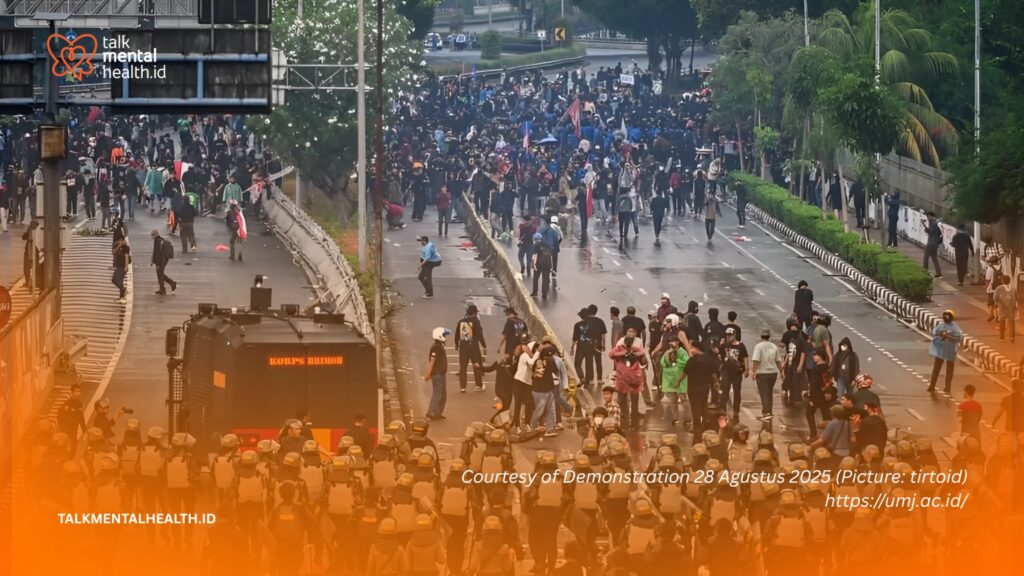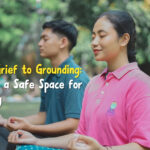In recent weeks, Indonesia’s political and social climate has been heating up once again, marked by growing social unrest. According to a CNN Indonesia report, demonstrations across various regions have voiced the “17+8 People’s Demands”—a series of 25 points echoing both on the streets and across social media, sparking conversations on change, resilience, and the urgent need for collective healing.
These demands cover a wide range of issues: from pushing for greater transparency in state institutions, protecting workers’ rights, improving governance, to strengthening democracy. Some are short-term goals (to be addressed by September 5, 2025), while others are longer-term (stretching to August 2026).
This spirit of resistance reflects how deeply the Indonesian people yearn for change. Yet, on the other hand, such moments of social unrest can significantly affect the psychological well-being of society—not only for those who take to the streets, but also for families waiting at home, and the wider public following the developments through the media.
This article seeks to explore: what are the psychological impacts of demonstrations? How can we strengthen support for one another through collective healing? And what practical steps can we take to safeguard our mental health amid such intense social dynamics?
Psychological Impact of Major Social Unrest and Paths to Collective Healing
Social actions such as demonstrations are not only about politics and economics but also deeply affect psychological well-being. Some of the common impacts on society include:
1. Stress and Anxiety
When the media is filled with narratives of conflict—ranging from demands for troop withdrawal, reports of violence, to the potential for clashes—our minds can easily drift toward fear. Questions like, “Is this protest safe? Will it turn into chaos?” are normal, but they can also trigger excessive anxiety.
2. Emotional Fatigue
Following the 25 points of the people’s demands—from parliamentary reform to freedom of expression—can feel mentally exhausting. Continuous exposure to heated debates on social media gradually drains emotional energy, leading to what many experience as social burnout.
3. Collective Trauma
Demonstrations are sometimes marked by incidents of violence. For some, witnessing or reading about clashes can reopen old wounds. This creates collective trauma—negative emotions shared simultaneously by a community during periods of social unrest.
4. Social Polarization
Protests can also divide society into opposing camps. Online conflicts often make us lose empathy, feel “threatened” by different opinions, or even cut ties with close ones. If not managed, this polarization can damage our collective mental health.
The Emo-Demo (Emotional Demonstration) Method for Collective Healing
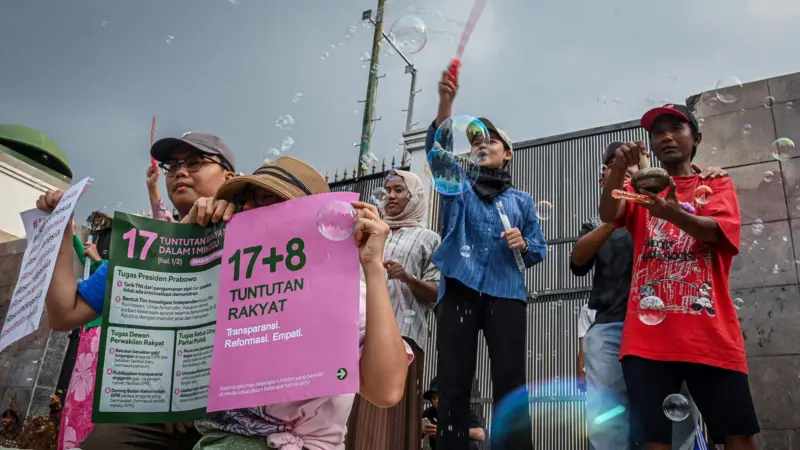
To strengthen mental health amid social unrest, we can explore emotional education approaches such as the Emo-Demo method. This is a participatory approach that touches emotions rather than relying solely on logic—helping communities process collective struggles and move toward collective healing.
Learning from Emo-Demo: Channeling Emotions for Collective Healing Amid Social Unrest
A 2023 study titled “Health Education Based on Emo Demo (Emotional Demonstration) to Improve Adolescents’ Knowledge About the Dangers of Smoking in Surabaya” showed that the method of emotional demonstration—delivering messages interactively by combining visual demonstrations, games, props, and physical interactions that engage the senses and emotions—making information easier to remember and more likely to influence real behavior.
Applied to the context of protests, this principle is highly relevant. Mass actions are essentially a form of emotional demonstration in public spaces: groups of people express grievances with strong emotions to be heard. On the other hand, the wider public observing these events also absorbs this emotional intensity, which can affect their mental health.
This means that how we manage emotions—whether as protest participants or as members of society witnessing the events—will significantly determine the long-term psychological impact. Just as the research proved that emotions can be used as a positive tool for education, demonstrations should ideally become spaces for healthy expression of aspirations, not sources of deeper wounds.
In this way, society can move from the strains of social unrest toward a path of collective healing, where emotions are transformed into solidarity, empathy, and resilience.
Why Emo-Demo Matters for Mental Health and Collective Healing in Times of Social Unrest
There are several reasons why the Emo-Demo (Emotional Demonstration) approach is highly relevant, especially in times of social unrest:
1. Touching Inner Feelings
Messages that tap into emotions—such as empathy toward victims of injustice—are more easily received, processed, and internalized by society. This emotional connection fosters deeper awareness and compassion, which are essential for collective healing.
2. Reducing Cognitive Burden
Amid overwhelming news and heavy political narratives, a visual–emotional method helps people process stress more effectively, rather than being overloaded with raw information. This creates space for mental clarity and resilience.
3. Building Emotional Resilience
By adopting an empathetic, educational approach, the community’s psychological strength is reinforced in facing uncertain realities. This not only helps individuals cope better with turbulence but also lays the groundwork for collective recovery and long-term well-being.
Why Is Mental Health Important Amid Social Unrest?
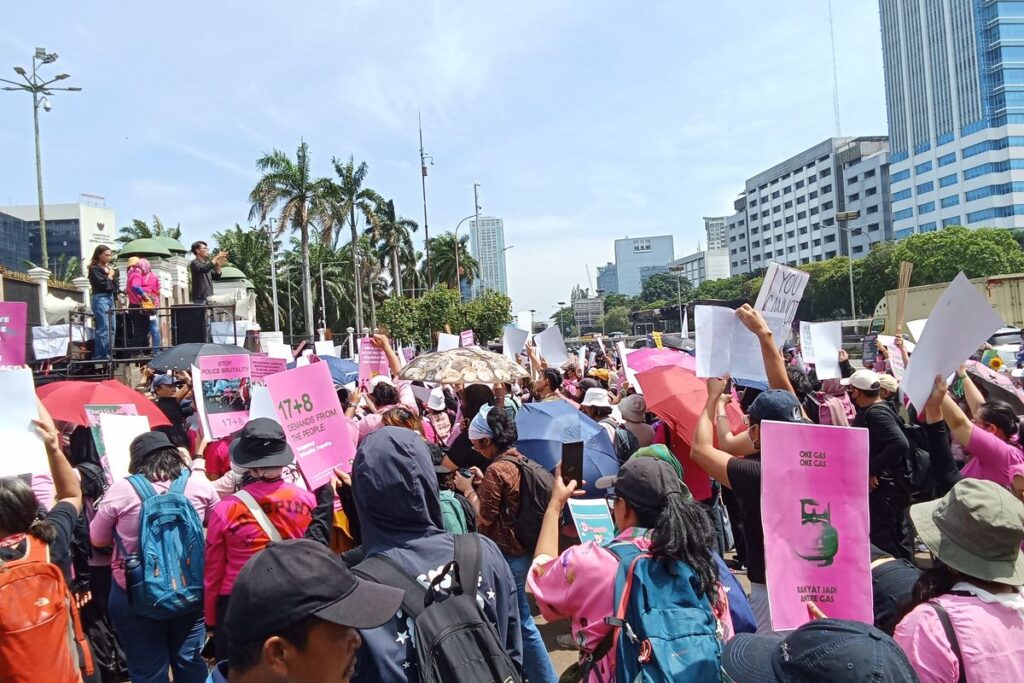
Behind the calls for change, one crucial aspect is often overlooked: the mental health of society. Mental health is the foundation that shapes how we respond to difficult situations. Individuals with stable mental well-being are better able to think clearly, make rational decisions, and maintain solidarity. On the other hand, when mental health is neglected, social unrest can turn into a source of prolonged inner conflict.
In other words, social change is not only about political structures but also about the emotional resilience of the people.
Emotional Solidarity and Collective Healing Amid Social Unrest
Amid pressure, we don’t always have to be strong on our own. Simple acts of support can make a huge difference:
- Listening with empathy
When a friend shares concerns about demonstrations, simply listening without judgment is already a meaningful form of support. - Creating safe spaces
Both offline and online, we can build small communities where people feel comfortable sharing stories, encouraging one another, and finding calm. - Acknowledging emotions
There’s no need to feel ashamed of anxiety, fear, or anger. Acknowledging emotions is the first step toward managing them in a healthy way.
By practicing emotional solidarity, society can move beyond the strain of social unrest and embrace collective healing, where empathy and support become the true foundation of change.
Practical Strategies for Mental Health Amid Social Unrest
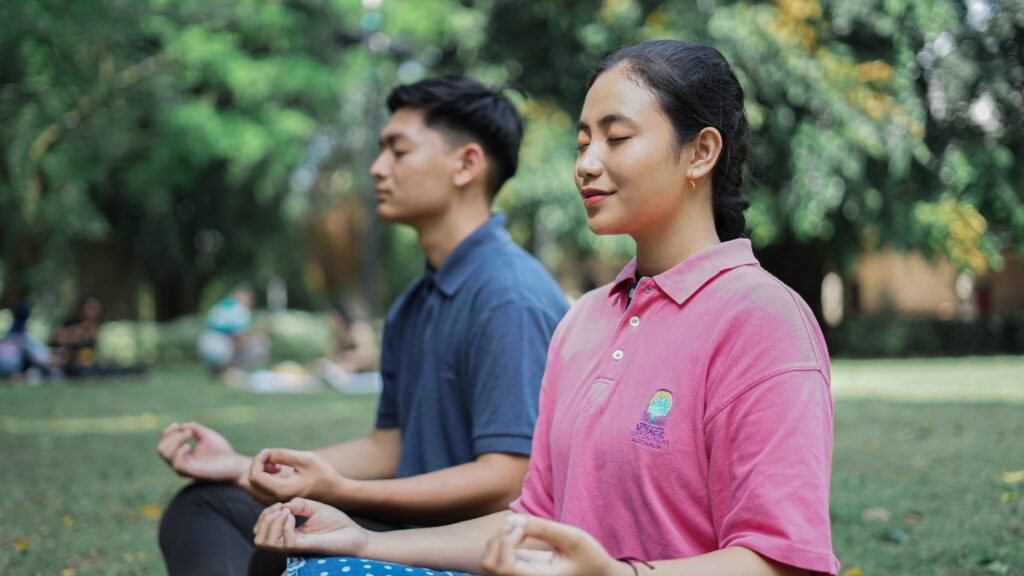
Here are some simple yet effective ways to maintain inner stability:
1. Limit Media Consumption
Set specific times to check updates—such as in the morning or evening—and avoid endless scrolling that can pile up anxiety.
2. Practice Breathing and Grounding
When emotions peak, inhale for 4 counts, hold for 4, exhale for 4. Focus on something tangible around you—like sounds or textures—to calm the mind.
3. Maintain Daily Routines
Adequate sleep, balanced meals, and time for hobbies are essential foundations for mental stability.
4. Express Through Writing or Sharing
Journaling emotions—anger, frustration, hope—can help in understanding yourself and easing emotional pressure.
5. Connect and Build Empathetic Communities
Find friends or communities willing to listen without judgment. A safe space to talk can reduce feelings of isolation and foster collective healing.
6. Try Emotional Education (Emo-Demo)
If you or your community are engaged in advocacy, try applying Emo-Demo techniques:
- Use visual props or emotional symbols
- Invite participation through role-play or interactive games
- Focus on messages that touch emotions and encourage reflection
7. Don’t Delay Professional Help
If anxiety or stress disrupts sleep, work, or relationships—seeking help from a psychologist or counselor is not a weakness, but a courageous step.
The Role of Community in Supporting Mental Health Amid Social Unrest
In times of social unrest, communities play a crucial role in supporting mental health. A strong community can serve as an anchor when situations feel overwhelming.
- Community media: a platform to share calming narratives instead of provocative messages.
- Healthy discussion spaces: safe environments to express concerns without fear of judgment.
- Solidarity movements: small actions such as collective prayers, relaxation classes, or positive social media campaigns that help sustain hope without adding pressure.
At Talk Mental Health ID, we believe that true change is not only about structural transformation but also about nurturing the psychological well-being of the people. By fostering empathy, community support, and practices of collective healing, society can move toward healthier and more sustainable progress.
Finding Calm in Chaos: Collective Healing Amid Social Unrest
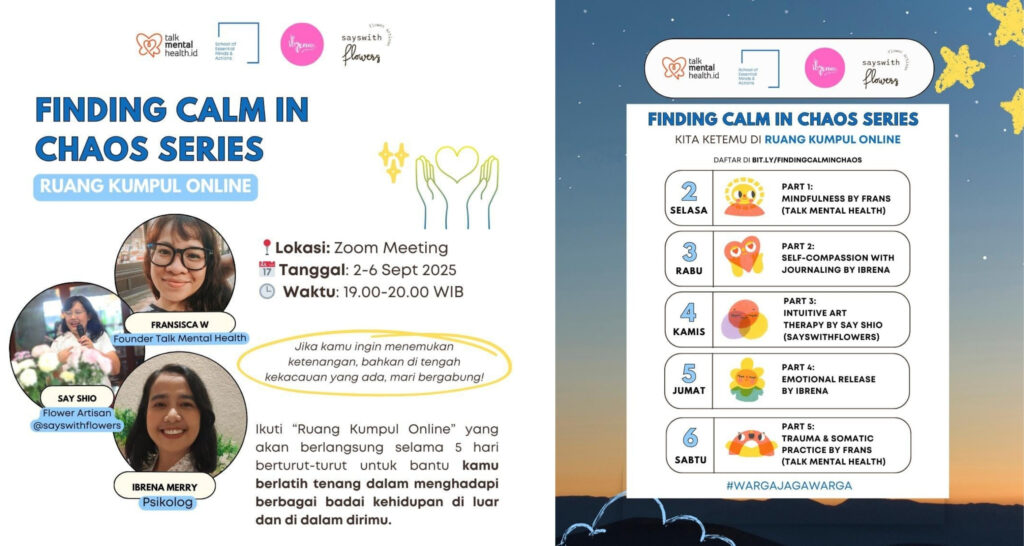
In response to the current wave of social dynamics and collective unrest, Talk Mental Health ID, together with its partners—Sayswithflowers, SEMA.IND, and Ibrena—launched the “Finding Calm in Chaos Series,” an online gathering held from September 2–6, 2025. Over five consecutive days, participants were guided through practices such as mindfulness, self-compassion, journaling, art therapy, emotional release, and trauma & somatic healing.
The purpose is simple yet vital: to provide a safe space for anyone seeking to validate their feelings, process emotions amid uncertainty, and strengthen inner resilience. In doing so, individuals not only learn to find personal calm but also nurture collective solidarity—a meaningful step toward shared healing.
Mental Health as a Force for Collective Healing in Social Unrest
The wave of the 17+8 People’s Demands reflects a collective spirit that is both critical and courageous. But lasting change requires not only public bravery—it also needs strong mental resilience.
Integrating approaches like Emo-Demo can serve as a tool to help us stay not only informed but also emotionally connected in healthy ways during social unrest. Through shared support, mindful information boundaries, stable routines, and empathetic spaces, we can grow stronger—while staying deeply human.
Talk Mental Health ID believes that nurturing mental health is an essential part of building sustainable change. That’s why we created the zine Not Okay, but Not Alone—a reminder that even in times of social unrest, collective healing is possible when we share our struggles and support each other.
Download your free zine here : talkmentalhealthid.org/freebies


